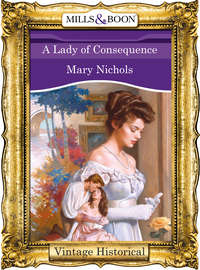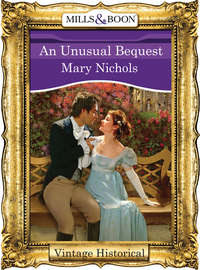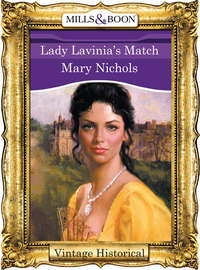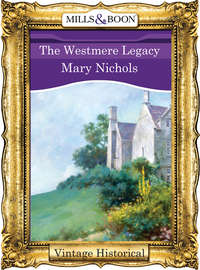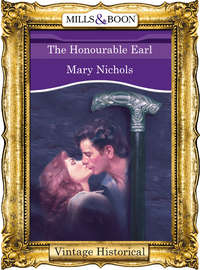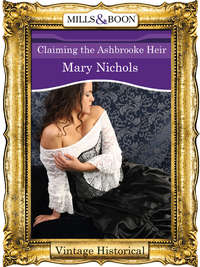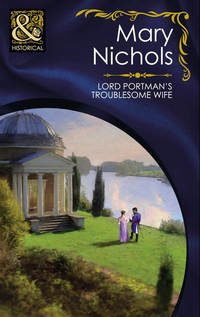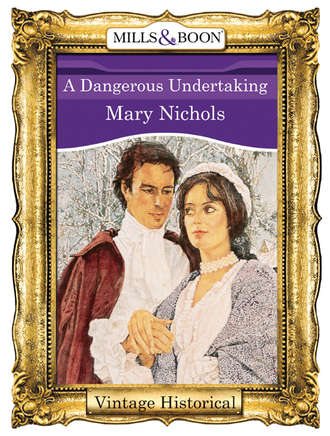
Полная версия
A Dangerous Undertaking
‘All night, mistress. I reckon the roads are about impassable. If it freezes harder, we’ll have to get the skates out to go anywhere, but the ice isn’t thick enough yet.’ She turned towards Margaret and smiled. ‘Still, we’re snug enough here. Shall I help you wash and dress?’
‘What? Oh, no, I can manage.’
‘But your poor hands. Let me help you, mistress. His lordship will be put out if he hears I left you to struggle with them little buttons on your own. And you shouldn’t put those hands in water, not till they’ve healed.’
Margaret acquiesced, and half an hour later Penny conducted her downstairs and showed her into the morning-room where Lord Pargeter sat alone, eating a late breakfast. He uncurled his great length from his seat and held a chair for her. ‘I trust you slept well, Mistress Donnington?’
‘Very well, thank you.’
‘Please help yourself to whatever you want.’ He indicated the many chafing-dishes on the table. ‘Or would you prefer me to do it? Your hands must still be painful.’
‘Hardly at all, my lord.’ She took a little ham, concentrating on her plate because she knew he was looking at her pensively, as if wondering how to make conversation with her. ‘I am afraid I do not make a very good oarsman.’
‘You did very well. Am I to assume you found Sedge House not to your liking?’
‘It was not the house,’ she said, ‘though it was in a parlous state.’ She looked round the room as she spoke. It was elegantly furnished in mahogany and walnut, some of it exquisitely inlaid with satinwood. The seat of the chair she sat on, like all the others, was covered in damask. The fireplace was of marble and the plastered ceiling was decorated with gilded scrolls. It exuded wealth and status; there could not have been a greater contrast with Sedge House. ‘My uncle was not expecting me and he had other guests,’ she went on, in a effort to excuse the behaviour of her unsympathetic relative.
‘Just so.’ He lifted a pot. ‘Chocolate?’
‘Thank you.’
He poured a cup of the thick dark liquid for her. ‘Your great uncle is a Capitain, just as you are,’ he said, as if that explained everything.
‘How do you know so much about me, my lord?’ she asked, though she could guess his information came from Charles Mellison, and that made her feel uncomfortable. She began to wish she had not been so open with the young man.
‘Master Mellison told me of his conversation with you,’ he said. ‘He told me you were going to live with your uncle.’
‘That does not mean I could condone…’ She paused, not wanting to put a name to what she had seen in her uncle’s house. ‘I never knew I had any relations until my mother was dying. Now I wish I had never come.’
‘What would you have done if you had not?’
‘I could have found work and lodgings, looked after myself.’
She could not read his expression. One minute it was solicitous, another almost malevolent. His dark eyes never moved from her face; it was as if he was studying every line of it, committing it to memory. What did he see there? she wondered. Was he trying to read signs of debauchery which would tell him she was like her great-uncle? Was he wondering if he dared keep someone like that under his roof? He broke the silence at last. ‘What kind of work have you done?’
‘I am a milliner, my lord.’
‘I doubt there is much call for hat-makers in Winterford, Mistress Donnington. We are a very rural community. The village used to be on the edge of the winter inundation; it was the only place where the fen could be safely crossed, which is how it got its name, but a hundred years ago, while Cromwell and the king battled it out for supremacy, the Adventurers fought against nature and won. Now Winterford is simply a slight rise in the surrounding land, all of it very fertile, but a long way from the beau monde of London.’
‘I was not thinking of setting up as a milliner here, my lord.’
‘What, then?’
‘I do not know. I am adaptable, my lord.’
He smiled and his sombre expression changed; his mouth softened and his eyes twinkled. ‘Just so long as it does not entail keeping house for your uncle, eh?’
‘He already has a housekeeper.’
Her smile dimpled her cheeks very attractively, he decided, though she still looked tense, half afraid. ‘Where would you live?’
‘I would have to find lodgings.’
‘Live alone? I hardly think that would serve.’ He paused, then asked slowly, ‘Have you thought of marriage?’
She smiled. ‘Doesn’t every young lady dream of it?’
‘Is there no one?’
‘No, my lord. I have been too busy…’ She stopped suddenly, remembering her conversation with Charles Mellison.
Encouraged, he went on, ‘I believe Master Mellison told you a little of my situation.’
‘My lord, he would not be so indiscreet.’
He chuckled suddenly. ‘You obviously know how to be discreet yourself, but you need not worry, I am not asking you to betray him; I know my friend very well and I can guess he told you I was looking for a wife.’
‘He did mention it in passing, my lord.’
‘Only in passing? I am persuaded he went out of his way to speak to you about it.’
‘I cannot think why he should do that,’ she murmured.
‘Did he not say we would do very well together, you and I?’
‘My lord!’ she protested.
‘Oh, please do not be alarmed.’ He stopped speaking to offer her warm bread in a cloth-lined basket. She shook her head, and he went on, ‘But he is right about my wanting to marry.’
‘I am sure you could have no trouble finding a suitable wife, my lord,’ she said demurely.
‘As to that, I am not so certain,’ he said. ‘You see, I am very particular and very difficult to live with. In truth, I am impossible.’
‘Surely not,’ she said, because she thought it was expected of her.
Her answer produced a short bark of a laugh. ‘Indeed I am. I am short-tempered, ill-mannered and I am wont to go off by myself for hours at a stretch. And as for making polite conversation…’ He shrugged. ‘Most of the time I find it tedious.’
‘You do not paint a very agreeable picture of yourself, my lord.’
‘I want you to know the truth.’
‘Why?’
‘Because…’ he went on, leaning slightly towards her and making her heart beat in her throat and flooding her face with colour. Surely he was not…? No, she was being absurd. ‘I believe you are in something of a fix yourself…’
‘Not so desperate that I have to resort to trying to live with a man who, on his own admission, is impossible to live with,’ she said with some spirit. ‘I pray you, do not assume that because I am in a little difficulty I have to throw myself at the first man who crosses my path. I listened to Master Mellison because politeness demanded it, but that does not mean I understood or wished to comply with whatever it was he was suggesting. I may be a Capitain, as you put it, but we are not all like my great-uncle, I assure you. My mother was a lady right to the end, in spite of being forcibly separated from all she held dear and having to earn a living.’ She pushed her chair back and stood up. ‘I am grateful for your hospitality, Lord Pargeter, but I should like to leave now.’
‘Leave?’ he queried, raising one dark brow. ‘I am afraid you can’t do that.’
‘I insist.’
He smiled. She was very angry indeed. Her cheeks were flushed and her eyes sparkled; she was not a lost kitten but a spitting one, and he found the transformation somewhat disturbing. ‘I am sorry,’ he said. ‘As soon as the roads are cleared of snow, of course you may leave. I would not dream of detaining you against your will. Please sit down and eat some breakfast; I can’t have you fainting again.’
She subsided into her chair, though she did nothing to obey his command to eat. She was sure that food would choke her.
‘That’s better. Now, let us begin again. You are very welcome to stay as long as you like, but there are certain things you should know.’ He looked closely at her, wondering how to go on. ‘Firstly, my friend Mellison.’
‘What about him?’
‘He is betrothed to my sister Kate.’
‘I know; he told me.’
‘He is also impetuous. Once he has an idea in his head, there’s no shifting it.’
‘About you needing a wife, you mean?’
‘Yes. He is quite convinced you are the very one.’
‘I am flattered,’ she murmured, but she didn’t sound very convincing. ‘But haven’t you got a mind of your own?’
His smile disappeared and his frown took over. ‘My mind is my own, Mistress Donnington, make no mistake about that. Unfortunately Charles was so sure of himself that he told my grandmother to expect you…’ He paused. ‘He said I had met you in London, at Lady Gordon’s…’
Margaret attempted to laugh, but it came out more like a strangled cry. ‘I have never met Lady Gordon.’
‘Please do not interrupt. Grandmama was overjoyed to know I am going to settle down at last.’ He grinned suddenly. ‘I am twenty-six years old and she was beginning to think it would never happen.’
‘It hasn’t,’ Margaret said sharply.
He ignored her interruption. ‘Lady Pargeter is very old and not always in good health. The doctors say she must not, on any account, be upset.’
‘I am sorry for that and, of course, I would not wish to upset her, but——’
‘Her ladyship has been led to believe I have brought you here to meet her. She wants to see you.’
‘Master Mellison had no right…’
‘Exactly what I told him, Mistress Donnington, but I am afraid he is unashamed. He is quite convinced he is in the right of it and you will agree to marry me.’
‘You have not asked me, have you?’
‘I am asking you now.’
‘In order to please your friend or your grandmother?’
‘I please myself.’ Again there was that angry set to his mouth which spoiled his looks.
Margaret found herself laughing hysterically. The events of the last two days had been so strange, the people she’d met even stranger. It was like being in a madhouse.
‘I am glad it amuses you,’ he said coldly, though he could not help noticing the dimple deepening near her mouth; he found it strangely alluring.
‘I am sorry,’ she said, taking a handkerchief from her reticule and dabbing at her streaming eyes. ‘But I never dreamed my first proposal would be so…so romantical.’
He stood up suddenly, crashing his chair back. ‘And I never expected the lady in receipt of my offer would laugh in my face.’ He strode to the window to look out on the white landscape and calm himself. Charles was right about one thing. There was no question of Susan’s coming down in this weather and neither could he go to her. The thought of never seeing her again filled him with impatience which could not be relieved unless he followed his friend’s advice and found someone else to marry. And Margaret’s laughter had served to harden his heart; and the fact that she was a Capitain went some way to salving his conscience. He turned back to her, once more in command of himself. ‘Please forgive me. I deserved your derision, but let’s not beat about the bush any longer. I need a wife and you need somewhere to live, so shall we begin again?’
The look on his face stopped her laughter. He was regarding her with an expression almost of loathing, and yet there was pain behind the dark eyes, as if the hate was more for himself than her. ‘I do believe you are serious!’
‘Certainly I am. After all, arranged marriages are nothing out of the ordinary and, if you have no one to make such arrangements for you, is there any reason why you should not make them for yourself? I am wealthy and I am not an ogre. I will make no great demands on you. You will have your own suite of rooms, a wardrobe befitting my wife, jewellery, carriage and horses, an allowance. To all intents and purposes, I will be the loving husband…’
‘And what do I have to do in return?’
‘Be a dutiful wife in the eyes of the world, at least while my grandmother is alive. After that——’ he shrugged—you may annul the marriage if you wish, so long as it has lasted at least a year. You will be amply recompensed in that event.’ He did not know how difficult an annulment would be, but, as he did not anticipate having to put it to the test, it was an easy thing to suggest.
She understood that the marriage was not to be consummated. It seemed extraordinary that he should not want an heir. And what significance was there in stipulating a year? ‘My lord, this conversation is becoming nonsensical,’ she said.
‘It will make more sense if you think about it,’ he said. ‘Do not dismiss my proposal out of hand and, as it looks as though you might be snowed up here for a little while, perhaps you would do me the courtesy of allowing yourself time to consider it.’
Agreeing to that could do no harm, she decided. ‘Very well, my lord. I will think about it.’
He smiled and returned to the table. ‘Thank you, but I must ask you to maintain the masquerade for my grandmother’s sake when you meet her.’
She was his guest, and an impoverished one at that; she agreed reluctantly. She didn’t see how deceiving Lady Pargeter would be any help at all if the marriage never took place. He was so willing to lie that she supposed he would soon invent a story of a lovers’ tiff and the engagement being all over.
She met her ladyship at dinner, which was taken at three in the afternoon, but, even as early as that, it was almost dark and the long dining-room was bathed in the glow of several chandeliers.
Physically Lady Pargeter was a tiny, very frail woman who had to be helped to her chair, but mentally, Margaret was sure, she was strong as iron and just as unbending. She wore a white powdered wig with a cap trailing ribbons sitting on top of it. Her undress gown of patterned silk flowed in pleats from an embroidered yoke, which did little to disguise the fact that she was little more than skin over bone. Her face did not look painted, although it was chalk-white and the cheeks sunken. But her brown eyes were alive, darting about the room, taking everything in, missing nothing. She lifted the lorgnette which dangled from a ribbon on her wrist and peered through it at Margaret.
‘So,’ she said, when everyone was seated and the silent footmen began to serve the meal, ‘are you my grandson’s choice or is he yours?’
Margaret did not know what to say, but before she could think of a suitable reply Roland came to her rescue. ‘It was mutual, Grandmama.’
He had changed into a lilac satin coat over a long embroidered waistcoat. His white breeches were tied with a bow below the knee. Pristine white ruffles adorned his throat and wrists and white stockings graced his elegant calves. He wore a powdered wig with side-curls and ringlets tied at the back with a black ribbon. He looked very stylish, but Margaret found herself thinking that she liked him best in plain country clothes which seemed to suit his muscular physique better. She blushed suddenly when she realised he was looking at her. Could he possibly have read her thoughts?
‘Do you know what you are letting yourself in for?’ Lady Pargeter demanded of Margaret, ignoring her grandson.
‘I think so, my lady.’
‘Good, because I wouldn’t want you to be under any illusions. Being married to a Pargeter heir is a dangerous undertaking, especially for a Capitain.’ She looked venomously at Margaret. ‘Did your mother never tell you that?’
‘No, she never mentioned Winterford at all, not until…until the day she died.’
‘Hardly to be wondered at.’
‘Grandmama, you are making something of nothing,’ Roland put in before Margaret could ask what she meant. ‘We will hear no more of it. Tell me, what have you been doing today?’
‘What is there to do in this God-forsaken place? Hannah read to me a little while and I worked on my needlepoint, but my eyes are not good enough for that now. I don’t know why I continue with it. Obstinacy, I suppose. I do not like being beaten. Oh, and I sat for a time looking out of my window.’ She gave a cackle of a laugh. ‘A wonderful view I have from my window—nothing to behold but the horizon and the sky.’
‘The sky is very beautiful,’ Margaret said. ‘I never realised it until yesterday.’
‘I did see something today, though,’ the old lady went on, ignoring Margaret’s comment. ‘I saw a woman in a rowing-boat, coming upriver from that…that place. She stopped at our jetty.’
Kate giggled and Charles said, ‘I didn’t see anyone, did you, Roland?’
‘At our jetty?’ he queried. ‘No, I did not.’
‘It’s funny she should turn up again,’ the old lady said, peering at Margaret. ‘You have a look of her…’
‘No, she hasn’t,’ said Roland quickly. ‘Mistress Donnington is nothing like her. And it was years ago, Grandmama…’
‘Is it? Oh, time means nothing to me now. Sometimes it drags, and weeks seem like years, and sometimes it is the other way round.’ She sighed. ‘What it is to be old. Everybody standing about waiting for you to die.’
‘Rubbish!’ said Roland.
‘Oh, Grandmama!’ said Kate. ‘You must not talk like that.’
‘Why not? I am long past the age when I should be in my coffin. My daughter-in-law has been dead these many years and now my son is gone. Why have I been left behind?’
‘Because we love you and do not want to part with you,’ Kate said.
‘There’s more to it than that,’ she said. ‘It has something to do with this young man here.’ And she poked Roland’s arm with her lorgnette. ‘I have been preserved, pickled in wine and brandy, simply in order to see the Pargeters with a new heir. I shall go to my grave in peace when that happens.’
Roland looked at Margaret as if defying her to deny the possibility. She concentrated on her plate, picking without appetite at fish in oyster sauce. What was going on? They were all talking in riddles.
‘So, when is the wedding to be?’ her ladyship continued. ‘I think it should be soon.’
‘But I am in mourning, my lady,’ Margaret put in, reluctant to talk of a marriage she never intended should take place, but she remembered just in time Roland’s warning to humour the old lady. Arguing with her might bring on a seizure. ‘My mother died less than two weeks ago.’
‘Where?’
‘In London.’
‘Your father? Was he one of the Donningtons of Devon?’
‘I don’t think so, my lady. He died when I was very small. In India.’
‘Oh, a merchant!’ There was contempt in her ladyship’s voice, and Margaret was tempted to defend the father she had never known, but changed her mind.
‘I believe so.’
‘Was he successful?’
Margaret forced herself to smile. ‘If he had been, I would not be here now.’
It was not an answer which pleased her ladyship. She drew her lips down into a thin line and tapped Margaret impatiently on the back of her hand with her fan. ‘My grandson honours you, and you would do well to remember it.’
‘Indeed, I do, my lady.’
‘Good. Have you any other kin, besides that reprobate Henry Capitain?’
‘I know of no one, my lady.’
‘Then who is there to complain if you marry while you are in mourning?’ She turned to her grandson. ‘I want it done and I want it done quickly. I have no time to waste, even if you think you have. And you haven’t, you know. Twenty-six and still single. You are not even a widower, which might excuse you.’
‘Oh, I say,’ Charles broke in.
‘I call spade a spade,’ she said. ‘And we all know it sometimes takes two marriages to produce an heir.’
Margaret was perplexed. ‘What does she mean?’ she whispered to Roland, who sat next to her.
‘My father’s first wife died in a fall from a horse soon after they married, and they had no children,’ he answered in an undertone. ‘My sister and I are the result of his second marriage. Grandmama is a little confused; she sometimes relives these little dramas. Pay no heed.’
The meal ended silently. It was as if the old lady’s talk of death had put a constraint on them all, and Margaret was glad when it was over and her ladyship rose to leave the table. Hannah, the old lady’s companion, who had shared the meal but not the conversation, was immediately at her side to help her to her room, leaving Kate and Margaret to go to the withdrawing-room together.
‘Oh, I am so glad you came,’ Kate told Margaret. ‘It gets dreadfully dull here sometimes.’
‘What do you do for amusement?’ Margaret asked her.
‘Sometimes we go to Cambridge or to the races at Newmarket. And there is always the fen.’
‘The fen?’
‘Boating and fishing and wildfowling. I don’t shoot, of course, but Roland is a crack shot, and Charles nearly as good. It isn’t surprising when you consider they both served with distinction in the army. They were in the same regiment—did you know that?’
‘No,’ Margaret said, choosing her words carefully. ‘His lordship and I had very little time to get to know each other. I had to nurse Mama.’
‘Of course, I understand. But you must think of the future now.’
Margaret didn’t want to think about it. ‘Tell me about yourself,’ she said.
‘Roland is eight years older than I am, you know. I believe my mother had several miscarriages between the two of us. I don’t remember her, but Roland says Papa was so delighted to have a daughter after so long, he spoiled me dreadfully.’ Her voice became sad as she added, ‘He died five months ago. Roland was missing at the time—it was just after the battle at Culloden—and we did not know what had happened to him. It was only when Charles got leave in the summer and came to tell us Roland had been wounded, and was being cared for by the Chalfonts in Derbyshire, that we knew he was alive. As soon as he was well enough to travel he returned to his regiment, and then of course he learned of Papa’s death and came straight home to take up his inheritance.’ She laughed lightly. ‘You know, sometimes he treats me like a daughter instead of a sister. He can be very pompous when he chooses.’
‘Yes, I can imagine that,’ Margaret said with a wry smile.
‘But you are not at all haughty and you will not treat me like a child, will you, even when you marry Roland? After all, you cannot be much older than I am.’
‘I am nineteen.’ She knew that she would soon be past marriageable age, especially as she had no dowry, but that didn’t mean she was desperate. ‘But I have not agreed to marry him.’
‘Oh, but you will, won’t you? You will be so good for him, I know you will. I knew it as soon as I saw you. Charles was right; all Roly needed was a little push in the right direction.’
Margaret felt herself being drawn further and further into the web and yet she seemed unable to do anything to free herself, and the longer the charade went on, the more difficult it became to speak out, to say she had no intention of marrying Lord Pargeter. She was about to pluck up her courage to do so, when Roland and Charles joined them.
They had some desultory conversation, and then Roland suggested showing Margaret over the house.
‘Capital notion!’ Charles said, grinning. ‘Kate and I will amuse ourselves with a little piquet. Hannah will be down again directly to chaperon us.’
Margaret followed Roland from the room, determined to tell him she would not fall in with his outrageous scheme. Although it was little past four o’clock it was already quite dark, and he picked up a lamp from the table in the hall and held it aloft. It revealed a vaulted gallery that towered the whole height of the building, panelled and hung with portraits.
‘My ancestors,’ he said, indicating the pictures. ‘The baronetcy was granted by Elizabeth when we lived in Ely and owned land on the higher ground above Winterford. As the fens were drained, so we acquired more. We have been in residence in the Manor since the Commonwealth.’ He led the way up the wide staircase. ‘The house is built in the shape of a crooked E. The staircase forms the central bar and most of the rooms we use are in the west wing, which is more protected from the prevailing wind than the east side.’ They reached the gallery, where they stood side by side, looking over the banister to the vestibule below. It was lit by two lamps near the door, and a huge fire whose warmth did not reach them.


